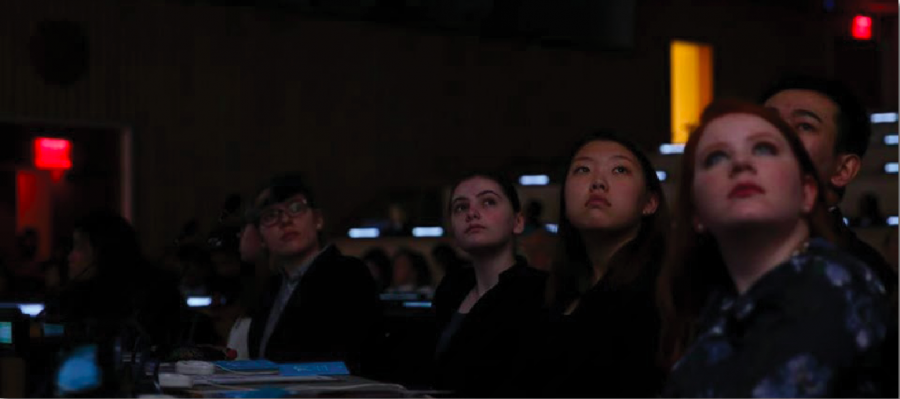Being Labeled ‘Gifted’ Isn’t Always a Gift
Photo courtesy of United Nations, used with permission of Dr. Katie Quartuch.
While Southern Lehigh High School gifted students are offered many enriching opportunities such as visiting the United Nations, some gifted students may experience programs that are very different, and even damaging.
The idea behind gifted education programs seems simple: children who are academically advanced should be taught at an accelerated rate and in a way that’s better suited for their unique brains. But in practice, being taught in a different way often means that gifted students are kept separate from their peers.
So the question to be asked is, are gifted programs harming their own students by separating them from their friends and shielding them from failure?
Currently, 3.2 million students nationally take part in gifted programs. In Pennsylvania alone, the number is over 72,000.
The federal Elementary and Secondary Education Act defines gifted and talented students as “students, children, or youth who give evidence of high achievement capability in areas such as intellectual, creative, artistic, or leadership capacity, and who need services and activities not ordinarily provided by the school in order to fully develop those capabilities.”
Academically, there is no doubt that gifted students benefit from such programs. Gifted and talented programs can challenge accelerated students in ways that traditional classrooms cannot. While a gifted student may resort to causing trouble or not paying attention, in the right environment, they can thrive.
“Well, when done correctly, I think it can provide a challenge that helps kids not hate school,” gifted education teacher Dr. Katie Quartuch said. “But my son’s in a different school and is in gifted, and I feel like his program is hurting him more than it should.”
The problem occurs when some gifted programs fail to nurture gifted students socially, emotionally, and mentally once they are labeled as “gifted.”
Since the beginning of gifted programs, schools have built their curriculum around the idea that children are either born with exceptional intellectual ability or they are not. Rather than anything to do with a child’s effort, giftedness is perceived as a genetic trait.
However, this mindset that gifted children are “born” smart can actually limit their potential. According to research by psychologist Carol Dweck, a fixed mindset forms when someone believes that their intelligence is inherent. Most gifted students tend to gravitate toward this belief because they have also felt assured in their biological ability. It becomes harder for them to form a growth mindset, the belief that intelligence and talent can be developed, because they lack the experience when it comes to overcoming academic obstacles.
The praise and positive reinforcement gifted students get for their intelligence can also be mentally demanding and draining as they grow older. Gifted students are told they are special, so they believe it.
While these students are no doubt smart and talented in their own ways, the pressure to maintain the standard of a “gifted” student can be taxing on young children. Students are held to the expectation to always be good at everything and prove they are “gifted.”
“When you’re surrounded by people who are all gifted, and you can see how a lot of them have done amazing things or think about things in a unique way, but you don’t see that in yourself,” junior Sarah Lindley said. “It does make you feel a little bad about yourself because you’re like, ‘I made it into this program; why aren’t I like them?’”
In addition, since many gifted programs teach their students in a nontraditional way, students may not experience dealing with academic challenges. Without proper study skills or experience with failure, many gifted students struggle the first time they face the harsh realities of high school or college academics.
“When I was taking gifted in middle school, we did a lot less work than the regular classes did. Everyone else had to read three books when we only had to pick one,” junior Anna Kim said. “They already had such high expectations; they didn’t guide us in the same way. They don’t teach us to study; they just expect us to know everything.”
According to a study by the Institution of Education Sciences, students who reported a lack of challenge in high school were less likely to be able to handle the challenge of college coursework. Contrary to the myth that intelligence alone will guarantee success, gifted students are more likely to struggle than “average” students.
Another unintended consequence of gifted programs is the isolation of students from their peers. Oftentimes children as young as kindergarteners are taken out of their regular classes and put in a special gifted classes and programs. Over time, this can result in a sharp social division between students in accelerated classes and students in regular classes.
“I still sometimes struggle to remember the names of certain people in my grade, because ever since sixth grade we’ve been separated and I’ve never been in classes with those people again. So it is definitely a little bit of removal,” Lindley said. “I think we are close within the people we found in the gifted program, but generally as a whole it’s a lot harder to enter that social sphere once you leave it in middle school.”
Such divide between academic groups only strengthens the “cliquey” nature of high school. Combined with the stereotype that gifted students are arrogant know-it-alls, it can be difficult to break free of the status quo.
“As far as my classmates go, I try not to make a big deal out of being advanced,” freshman Cyrus Desai said. “I don’t want to alienate any of my classmates or make myself unapproachable because they think I’m somehow ‘too smart for them.’”
This divide between “gifted” students and “average” students raises another question. When they focus resources on gifted education, are schools inhibiting “average” students from reaching their full potential? Are students with just as much potential, but without the gifted and talented label, pushed in the same way toward success?
At the end of the day, gifted programs are complicated. While their goal is to give kids the best shot in life, they often unintentionally damage students as well. Every student, gifted or not, should be given just as much support from their school to succeed. A label shouldn’t change that.

Saskia Van’t Hof is a fourth-year staff reporter and second-year Editor-in-Chief and Opinion Editor for the Spotlight. She is also president of Key Club,...



